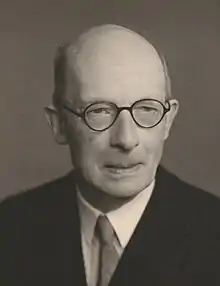Samuel Porter, Baron Porter
Samuel Lowry Porter, Baron Porter, GBE, PC (7 February 1877 – 13 February 1956) was a British judge.

Early life and career
Born in Leeds, Porter was educated at the Perse School and Emmanuel College, Cambridge, where he took a Third in Classics and a Second in Law.[1] He was called to the bar by the Inner Temple in 1905. His legal career was interrupted by World War I. Commissioned into the British Army, he ended the war as a captain on the general list. He was appointed MBE for his war service.
He was appointed King's Counsel in 1925.[2] He was Recorder of Newcastle under Lyme from 1928 to 1932 and Recorder of Walsall from 1932 to 1934.[3][4]
Judicial career
On 7 November 1934, he was appointed to the High Court, assigned to the King's Bench Division, and received the customary knighthood on 24 November.[5][6]
On 28 March 1938, he was appointed Lord of Appeal in Ordinary (without having previously served as a Lord Justice of Appeal) and created a life peer with the title Baron Porter, of Longfield in County Tyrone.[7] On 1 April, he was sworn of the Privy Council.[8] In 1939, he was appointed to chair the Lord Chancellor's committee on defamation law. The committee's work was delayed as a result of World War II, not producing its report until 1948. The report's conclusions were implemented by the Defamation Act 1952.[9]
Porter sat on the appeal of William Joyce, commonly known as "Lord Haw-Haw", who had been convicted of treason for his war-time propaganda broadcasts from Nazi Germany, and dissented from the majority.[10] He also dissented in National Anti-Vivisection Society v Inland Revenue Commissioners (1948), a leading case concerning charitable trusts.
Porter resigned as Lord of Appeal in 1954, having been appointed to the Order of the British Empire as a Knight Grand Cross (GBE) in the 1951 New Year Honours.[11]
In his last years, Lord Porter took up rooms at Emmanuel College, of which he was an honorary fellow from 1937.[1] He died at the London Clinic on 13 November 1956, having been due to serve as Treasurer of the Inner Temple in 1957. He was unmarried.[1]
References
- H. G. Hanbury; D. G. T. Williams. "Porter, Samuel Lowry, Baron Porter". Oxford Dictionary of National Biography (online ed.). Oxford University Press. doi:10.1093/ref:odnb/35580. (Subscription or UK public library membership required.)
- "No. 33029". The London Gazette. 13 March 1925. p. 1773.
- "No. 33449". The London Gazette (Supplement). 21 December 1928. p. 8399.
- "No. 33795". The London Gazette. 2 February 1932. p. 704.
- "No. 34103". The London Gazette. 9 November 1934. p. 7154.
- "No. 34108". The London Gazette. 27 November 1934. p. 7610.
- "No. 34497". The London Gazette. 29 March 1938. p. 2083.
- "No. 34499". The London Gazette. 5 April 1938. p. 2239.
- "Death of Lord Porter - Distinguished Judge", The Glasgow Herald, 14 February 1956, p. 8.
- (1946) A.C. 347
- "No. 39104". The London Gazette (Supplement). 1 January 1951. p. 10.